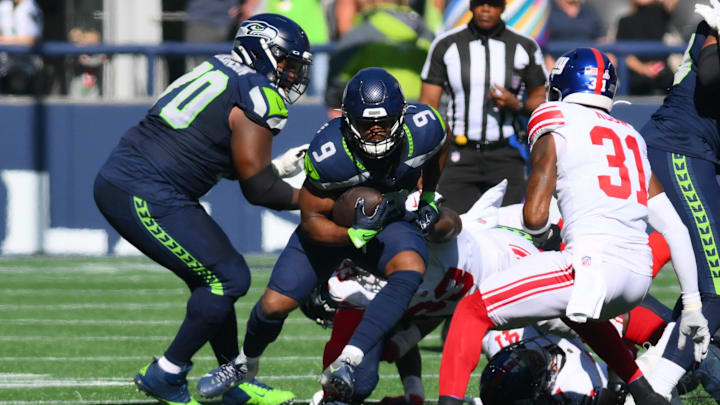Seattle Seahawks' Offensive Formula Needs Tweaking - And Fast

SEATTLE, Wash. - The best quarterbacks always want the football in their hands. Orchestrating the Seattle Seahawks' new offense coordinated by Ryan Grubb, Geno Smith has had the ball in his hands as much as any signal caller in the sport this season.
Through Seattle's first four games, Smith had dropped back to throw 175 times, the second-most in the NFL behind only Cleveland's Deshaun Watson. Statistically, those increased opportunities have paid off for the veteran gunslinger from an individual perspective, as he entered a Week 5 matchup against the Giants leading the league in passing yards and completions while ranking second in completion percentage, helping lead the team to a 3-1 start.
But as demonstrated for the second time in less than a week in Sunday's ugly 29-20 loss to the undermanned Giants, that pass-centric approach deployed by Grubb with little regard for the run game isn't going to cut it for the long haul if the Seahawks want to fulfill playoff aspirations in year one under coach Mike Macdonald.
Watching from the sidelines as the unforeseen beatdown unfolded, Macdonald had a front row seat as New York buried his defense by eating more than 25 minutes of possession time in the first half alone on Sunday. Some of that boiled down to the defense's inability to tackle or stop the run, but Grubb's offensive game plan didn't help the situation by oddly calling 15 passes on 17 offensive plays in the first two quarters, all but forgetting star running back Ken Walker III even exists by giving him the ball just twice before halftime.
When asked about Walker's lack of usage following the game, Macdonald indicated Seattle had a game plan to air it out early, but the lack of plays as a whole prevented the run from being established and a deficit in the second half also limited touches in the run game.
"That's definitely a fair question," Macdonald said. "We've got to get the run game going. The way the game started, we were thinking about getting Geno going early and not sure how many plays we had in the first half, but it wasn't many. The game started to get out of hand there, so we had to get going, but we've got to get the run game going and get Ken the ball more."
On four first half possessions, with Walker largely being a bystander and the run game viewed as optional at best by Grubb, the Seahawks punted three times and didn't have more than 25 net yards on any of those drives. If not for a late drive engineered by Smith to set up a Jason Myers field goal before halftime, they would have been shut out as the Giants teed off on the quarterback and held them to one third down conversion on four attempts.
This trend rolled into the second half, as Walker only carried the ball three additional times in the final two quarters, finishing with five carries for 19 yards despite being healthy. Behind him, Zach Charbonnet only toted the rock twice for 11 yards with Seattle running a grand total of seven traditional run plays on 58 snaps.
For those who aren't mathematicians, that equates to 12 percent. Even the late, great Air Raid master Mike Leach would have been screaming in the press box to run the ball more.
While Grubb may have been able to get away with such pass-heavy splits at the college level, he isn't in Montlake anymore, and opposing defensive coordinators have already started to punish him for stubbornly avoiding the ground game.
On Sunday, without any respect for Seattle running the ball, New York defensive coordinator Shane Bowen aggressively brought the blitz, frequently sending more rushers than Grubb's beleaguered offensive line could handle. This left Smith hanging out to dry on several occasions as he absorbed seven sacks during the game, often finding multiple defenders in his lap right after the snap on drop back after drop back attempt.
For his part, Smith said he doesn't pay attention to the pass/run distribution during games, and regardless of what Grubb sends in as a play call, he demands better from himself than he provided the Seahawks on Sunday.
"Honestly, I don't even think about that when I'm playing," Smith remarked. "I've got to execute the plays that are called. I've got to do my job. That's my main focus, to do my job to the highest of highs of my ability. So those things are questions you should ask the coaches. In reality, I've just got to go out there and play better. I've got to do better to get us over the hump."
If the Seahawks attempted to run the ball early and simply couldn't get it going, Grubb's strategy would have been more understandable, if not fully defendable given the team's weapons on the outside and Smith's strong start. But there wasn't even an attempt to aim for any balance on offense against the Giants, as Walker's two carries obviously is far too small a sample size to come to the conclusion that running the ball wasn't going to be effective.
Last Monday night, Grubb employed the same approach in Detroit with Walker running just four times before halftime and Smith throwing 24 passes in that span. But out of the break, he leaned on the dynamic back, who rushed for 74 of his 80 yards in the final two quarters and ripped off three 20-plus yard runs, which opened up the passing game for Smith as the Seahawks scored three straight touchdowns to climb back into the game.
Such adjustments were nowhere to be found on Sunday, however. Even as Dexter Lawrence, Brian Burns, and Kayvon Thidodeaux pinned their ears back hunting Smith in the pocket, Grubb stubbornly kept calling pass play after pass play, only running once in a blue moon in what could be described as nothing but a random phenomenon rather than a designed change of pace.
In the NFL, such lopsided playcalling simply doesn't work. Even the most pass-heavy teams in the league have to find a way to at least keep defenses honest by running the football. What makes it worse for the Seahawks is that Grubb has one of the most explosive backs in the sport in Walker and he should be eager to give him the football at least 15 times a game regardless of game plan. Charbonnet could start for a few teams and also provides a steady option as a between the tackles runner.
With that type of talent at his disposal, there's no excuse. This isn't the Pac-12 after dark anymore. Opponents such as the 49ers coming up on Thursday will be more than happy to see Walker get just five touches and Smith drop back to pass more than 80 percent of the time for Nick Bosa to come after him.
Grubb has proven that he can develop a prolific passing attack everywhere he has been and Smith has undoubtedly benefited from his system to this point. But for his scheme to translate at this level with the Seahawks for the long haul, he has to learn quickly from these two losses that slipped away and get back to his roots as a former run game coordinator with the goal of supporting his quarterback and offensive line with a more balanced attack.
